Applications for the Centre for Digital Entertainment EngD are now open. We are currently recruiting for academic year 2017/18. For more information or to apply Click Here.
/ Full archive
BUCRU – not just for Writing Week
We’re coming to the end of Writing Week in the Faculty of Health and Social Sciences and by now you will have made a good start or have put the finishing touches to your academic writing projects. Over the last week, we have given you some tips on writing grant applications and highlighted some of the expertise within BUCRU. If you didn’t get the chance to pop in and see us we thought it would be useful to remind you what we’re about and how we can help.
Bournemouth University Clinical Research Unit (BUCRU) supports researchers in improving the quality, quantity and efficiency of research across the University and local National Health Service (NHS) Trusts. We do this by:
- Helping researchers develop high quality applications for external research funding (including small grants)
- Ongoing involvement in funded research projects
- A “pay-as-you-go” consultation service for other work.
How can we help?
BUCRU can provide help in the following areas:
- Study design
- Quantitative and qualitative research methods
- Statistics, data management and data analysis
- Patient and public involvement in research
- Trial management
- Ethics, governance and other regulatory issues
- Linking University and NHS researchers
Our support is available to Bournemouth University staff and people working locally in the NHS, and depending on the support you require, is mostly free of charge. There are no general restrictions on topic area or professional background of the researcher.
If you would like support in developing your research please get in touch through bucru@bournemouth.ac.uk or by calling us on 01202 961939. Please see our website for further information, details of our current and previous projects and a link to our recent newsletter.
From Draft to REF with CEMP’s new Publishing Partnership Initiative
Do you have an incomplete paper that you’ve been sitting and can’t seem to finish? Have you recently presented at a conference, but haven’t written-up a paper out of your presentation yet? Did you get a rejection and are struggling to get motivated again? Or maybe you’ve written a couple chapters of your PhD and are hoping to turn one into a publication?
Whatever the scenario, CEMP’s new Publishing Partnership Initiative (PPI) can help you to collaborate with another researcher to turn your ideas into a viable REF-ready journal article. And did we mention, you can win a free dinner for two?
Publishing Partnership Workshop
Thursday January 26th
Talbot Campus, BU
11:00-14:00
WG 05 (Weymouth House)
To launch the initiative, this workshop will introduce the Publishing Partnership Initiative and help you find a good match to develop your REF output. We will also discuss strategies and tips for working toward REF submissions:
11:00-11:15 Introductions and coffee
11:15-11:30 Welcome to the PPI scheme (Anna and Richard)
11:30-12:00 Hear No Evil, See No Evil: What you need to know about REF and the Sterne review (Julian & Dan J)
12:00-12:45 Interactive session: Strategies for fitting writing into our busy schedules (Brad & Karen)
12:45-13:15 Academic Match.com: Finding the right journal and writing partner for your research output (Anna and Isa)
13:15-14:00 Catered planning lunch with our publishing partners
To participate: Send a 500+ word rough draft or outline of a potential research paper to afeigenbaum@bournemouth.ac.uk AND Richard rberger@bournemouth.ac.uk by Monday 23rd January 2017. This might be an abandoned draft, a conference version of a paper presentation or an outline for a possible research paper. At this stage, any draft you have might be gold, so don’t be shy!
To be a mentor or writing partner: Send an email with a list of your research and methodological areas of expertise to afeigenbaum@bournemouth.ac.uk AND Richard rberger@bournemouth.ac.uk by Monday 23rd January 2017.
Eat your Success! Partners who successfully submit a paper to a peer review journal within the 5 month time frame will receive a ‘dinner for two’ voucher to celebrate their success.*
*Voucher is worth up to £45.00. Does not cover alcoholic beverages.
We will aim to pair colleagues around expertise either in the same research area or in relation to the methodological approach. At least one partner will be accustomed to journal publishing and the REF process, as well as to the challenges facing us to find the time to research and write. In the first instance, this workshop is geared toward UoA 25, 34 and 36 entries (covering Education, Media Practice and Media Studies). For full details see: http://www.civicmedia.io/events-2/publishing-partnership-initiative/
*This project was initiated by Anna Feigenbaum and Richard Berger. It is supported by the UoA 25 development fund, CEMP, the Civic Media Hub & the Journalism Research Group.
How can automation and machine intelligence assist defence intelligence analysis?

Digital Catapult is running a Pit Stop with the Defence Science and Technology Laboratory (Dstl) in March 2017. Small and medium sized companies, academics and experts interested in developing innovative automation and machine intelligence solutions to assist defence intelligence analysts are encouraged to apply.
The aim of the Pit Stop is to increase understanding and use of the rapidly developing multidisciplinary field of “autonomous agents” (unsupervised software and devices that undertake analysis on behalf of individuals or groups, without the requirement of human interaction) for operational planning.
Innovators experienced in developing solutions for autonomous data analysis and interpretation, with expertise in the following areas are encouraged to apply:
- Machine learning
- Artificial intelligence
- Machine intelligence
- Big data
- Automation
- Predictive analytics
- Automated planning
- Autonomous intelligence systems
- Cognitive science
The closing date to apply for this Pit Stop is Friday 27 January 2017.
Artificial Intelligence(AI) – IBM Watson AI Prize

UK innovation centre supports artificial intelligence competition designed to change the world for the better.
As part of its wider strategy to support market-led technology and innovation, Digital Catapult will support IBM Watson AI XPRIZE via its technical experts as resources and mentors for competing teams. Digital Catapult will also form a hub for UK teams by hosting events, meet-ups and take a lead in helping to showcase the best competitors to come out of the UK.
Artificial intelligence and machine learning fall under one of the four priority technology areas that are strategically important for Digital Catapult and also aligns to Innovate UK’s emerging and enabling technologies strategy. The organisation will be supporting the IBM Watson AI XPRIZE as part of its mission to help the UK achieve the full potential of digital technologies.
XPRIZE, the global leader in incentivized prize competitions, aims to accelerate adoption of AI technologies and spark creative, innovative and audacious demonstrations of the technology that are truly scalable. The call for teams to enter closes on 19 January 2017.
For more information about the XPRIZE competition, visit the website, and/or project page and follow them on Twitter @xprize. Digital Catapult @DigiCatapult.
Media coverage in Nepal
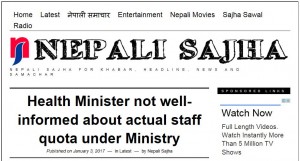 Yesterday’s health promotion dissemination meeting in Kathmandu has been widely reported in the national media in Nepal. Some of the national media focused largely (but not solely) on the words of the Minister of Health Mr Thapa, whilst the television news reports included the organisers and presenters at the event. The Green Tara Nepal Health Promotion Dissemination conference in Kathmandu was supported by the Centre for Midwifery, Maternal & Perinatal Health at BU and Liverpool John Moores University (LJMU) and Green Tara Trust UK (a Buddhist charity based in London). BU has been working with Green Tara Nepal for the past eight years on a number of maternal health promotion projects in rural Nepal.
Yesterday’s health promotion dissemination meeting in Kathmandu has been widely reported in the national media in Nepal. Some of the national media focused largely (but not solely) on the words of the Minister of Health Mr Thapa, whilst the television news reports included the organisers and presenters at the event. The Green Tara Nepal Health Promotion Dissemination conference in Kathmandu was supported by the Centre for Midwifery, Maternal & Perinatal Health at BU and Liverpool John Moores University (LJMU) and Green Tara Trust UK (a Buddhist charity based in London). BU has been working with Green Tara Nepal for the past eight years on a number of maternal health promotion projects in rural Nepal.  Overall the media in Nepal had difficulty understanding the notion of ‘health promotion’, therefore many journalists focused on health services as this was mentioned by the Minister of Health.
Overall the media in Nepal had difficulty understanding the notion of ‘health promotion’, therefore many journalists focused on health services as this was mentioned by the Minister of Health.
The event was also attended by BU Visiting Faculty Prof. Padam Simkhada (based at LJMU), CMMPH PhD student Preeti Mahato and FHSS Post-Doc. Dr. Pramod Regmi.
Prof. Edwin van Teijlingen
CMMPH
Making the Most of Writing Week: What to do with your Data?
You don’t have to spend Faculty of Health and Social Science Writing Week (3rd to 6th January) working on grant applications. You may already have a dataset and now finally have some time to do something with it. But where to start? It’s often a good idea to go back to your original research questions/aims/objectives… a well thought out research question can help shape your analysis strategy.
Hopefully you will have a record of which variables you were measuring and how data were coded. Were any calculations performed using the raw data to create new variables? How were these done? This is all part of good data management. To find out more visit the information pages created by the Library and Learning Support Team.
Once you are reacquainted with your data, it’s often a good idea (in the case of quantitative data) to start plotting graphs to find out more. Always keep in mind the original aims of the study, it’s easy to wander down a path of distraction. If you are feeling confused by all of this or, have got yourself lost down a data track, the BU Clinical Research Unit team are at hand to help.
Peter Thomas is available on Tuesday and Wednesday while Sharon Docherty is available Thursday and Friday this week. Why not drop us an email or pop by to see us in R505?
Health Promotion feedback meeting in Kathmandu
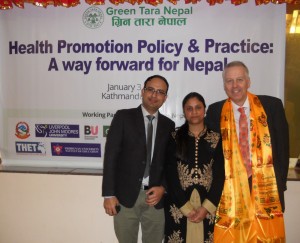 Today the charity Green Tara Nepal (GTN) in collaboration with two UK universities, BU and Liverpool John Moores University (LJMU) presented the findings of its long-term maternal project plus a review of health promotion in (a) government policies and strategies and (b) the curricula of university-based health courses in Nepal. The event in Hotel Yellow Pagoda was attended by the Nepal’s Minister of Health Mr. Gagan Kumar Thapa. We presented some of the key research findings of the GTN maternity project which have shown that interventions based on health promotion principles using women’s groups can be effective in the community.
Today the charity Green Tara Nepal (GTN) in collaboration with two UK universities, BU and Liverpool John Moores University (LJMU) presented the findings of its long-term maternal project plus a review of health promotion in (a) government policies and strategies and (b) the curricula of university-based health courses in Nepal. The event in Hotel Yellow Pagoda was attended by the Nepal’s Minister of Health Mr. Gagan Kumar Thapa. We presented some of the key research findings of the GTN maternity project which have shown that interventions based on health promotion principles using women’s groups can be effective in the community.
Bournemouth University was represented by Dr. Pramod Regmi (FHSS), Mrs. Preeti Mahato, PhD student in the Centre for Midwifery, Maternal and Perinatal Health (CMMPH) and Prof. Edwin van Teijlingen. One of the strengths of Green Tara’s approach is its collaboration with UK universities for its research. Several excellent MSc and PhD students have been, and some, such as CMMPH’s PhD students Sheetal Sharma and Preeti Mataho, still are, contributing to the health promotion evidence base.
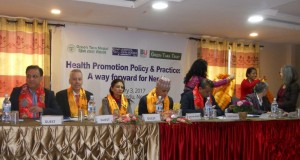
The workshop was attended by a range of directors of NGOs (Non-Governmental Organisations), INGOs (International Non-Governmental Organisations), academics, the Government of Nepal, and many other stakeholders including the media. The GTN Chair Krishna Lamsal commented: “This dissemination workshop follows on from the First National Health Promotion Conference in Nepal in which Bournemouth University was also a joint organiser. The 2003 conference brought together nearly 300 people for the first time to discuss key issues in health promotion.”
Free access to two modules from the BMJ’s Research to Publication tool
![]() The BMJ have launched a new research tool called Research to Publication, with the aim of getting more authors from submission to publication. It is comprised of a series of self e-learning modules, enabling researchers to hone and improve their research capabilities.
The BMJ have launched a new research tool called Research to Publication, with the aim of getting more authors from submission to publication. It is comprised of a series of self e-learning modules, enabling researchers to hone and improve their research capabilities.
This is not a free product, but they are offering free access to two modules – How to Write and Publish a Study Protocol and Introduction to Randomised Blinded Trials. If anyone is interested in this product, you can access the two free modules here. If you do take a look at the free modules, I’d be very interested in any feedback you have about the product. Please send feedback to cwentzell@bournemouth.ac.uk.
Challenge Project – Home Office

The Home Office, through the Joint Security and Resilience Centre, invites responses for its call on challenge project. This aims to capture strategical and tactical barriers which inhibit the security sector and develop project work against proposed solutions. Projects must provide demonstrable effort towards at least one of the following:
•deliver a joint response to the UK’s national security challenges;
•drive the delivery of the right solutions;
•growth of the security sector.
Suggestions for future areas of research are welcome.
10 awards, each worth between approximately £25,000 and £50,000, are available.
Click here for more information including how to apply.
Closing deadline is 22 January 2017.
If you are interested in submitting to this call you must contact your RKEO Funding Development Officer with adequate notice before the deadline.
For more funding opportunities that are most relevant to you, you can set up your own personalised alerts on Research Professional. If you need help setting these up, just ask your School’s/Faculty’s Funding Development Officer in RKEO or view the recent blog post here.
If thinking of applying, why not add notification of your interest on Research Professional’s record of the bid so that BU colleagues can see your intention to bid and contact you to collaborate.
EPSRC Sandpit: New Industrial Systems
| Opening date: | 05 January 2017 | |
|---|---|---|
| Closing date: | 02 March 2017 at 16:00 | |
| Status: | Future | |
| Tag: | Expression of interest | |
| Related themes: | All themes |
 The EPSRC’s Manufacturing the Future theme is highlighting a future call for a Sandpit in New Industrial Systems.
The EPSRC’s Manufacturing the Future theme is highlighting a future call for a Sandpit in New Industrial Systems.
In response to future manufacturing challenges EPSRC is running a sandpit with a focus on New Industrial Systems to engender a radical change in the research undertaken in this field in the UK. EPSRC hope that this sandpit will enable UK researchers to identify and undertake research with the potential to have a transformative impact on our manufacturing industries.
It is expected that up to £5 million of EPSRC funding will be made available to fund research projects arising from this sandpit. Keep an eye on the their website if you wish to express an interest in attending the sandpit (EoI opens 5/1/17).
Making the Most of Writing Week: Research grant applications – not THAT PPI
Remember, there are members of the BU Clinical Research Unit team available during the Faculty of Health and Social Sciences Writing Week to help you (you don’t need to be FHSS to speak to us, we’re here to help anyone doing health research) along the way. Today we’ll focus on Helen Allen.
Once you have decided on a funder, an important (but sometimes overlooked) aspect of working up a grant application is the planning and documenting of the involvement of service users/patients/relevant groups or organisations (Public Patient Involvement or PPI) ie the people most likely to have a vested interest in the research you are intending to do. Indeed, many major national funders, including the NIHR, require detailed evidence of how service users have been involved. But do you know who to approach? When? How? What can service users be involved with? What can they add? Sometimes it’s relatively straightforward to identify appropriate individuals and organisations. Other occasions can call for more creativity. Hot tip: everything takes longer to arrange than you might think. Allow a minimum of 6 weeks to plan, consult service users and feedback from the PPI consultation to your colleagues.
If you’d like some advice about planning PPI and conducting service user consultations for a project Helen Allen will be pleased to advise you. Helen is available on Tuesday 3rd and Thursday 5th January.
Writer’s block? Wondering where to start? Need someone to talk to? BUCRU can help!
Happy New Year! If making more time for writing grant proposals and research articles is one of your New Year’s Resolutions, then make the most of HSS Writing Week (3rd to 6th January). The aim of this week is to help support staff to find time in their busy schedules to work on those all-important grant proposals and research articles that keep getting lost under piles of marking.
We’re not expecting you to do it alone. Did you know that the Bournemouth University Clinical Research Unit can provide support for people undertaking healthcare research? As part of Writing Week, members of the unit will be available to help during the week (see below) so why don’t you pop in and see us (5th floor Royal London House) or send us an email.
BUCRU Availability
| Who? | When? | What with? |
| Peter Thomas
(Professor of Healthcare Statistics & Epidemiology) |
Tuesday and Wednesday | research study design and statistics |
| Helen Allen
(Public and Patient Involvement Lead) |
Tuesday and Thursday | involvement of service users in research projects, arranging focus groups and interviews |
| Sharon Docherty
(Research Fellow: Quantitative Methods) |
Thursday and Friday | designing, conducting and analysing quantitative research |
Happy New Year from your new Research Facilitator for FHSS & FST
 I have recently joined the Research and Knowledge Exchange Office (RKEO) as the Research Facilitator for the Faculty of Health and Social Sciences (FHSS) and the Faculty of Science and Technology (FST), covering Jenny Roddis’ maternity leave.
I have recently joined the Research and Knowledge Exchange Office (RKEO) as the Research Facilitator for the Faculty of Health and Social Sciences (FHSS) and the Faculty of Science and Technology (FST), covering Jenny Roddis’ maternity leave.
As Research Facilitator I provide support to researchers from the outset to develop their ideas, including horizon scanning and identifying potential funding opportunities, building research teams and advising on bid content and structure.
Before joining RKEO I was Clinical Research Co-ordinator in the Bournemouth University Clinical Research Unit, which entailed working closely with researchers in local NHS Trusts to facilitate collaborations with academics across BU. I have a BSc in Psychology from Cardiff University, and a background in mental health research having previously worked as a Research Assistant in Dorset HealthCare University NHS Foundation Trust. Whilst there, I co-ordinated NHS grant applications, designed, costed and delivered research projects including the recruitment and assessment for a large MRC funded trial.
I look forward to meeting those I don’t yet know in the near future, but please feel free to contact me should you have any questions or queries. You can contact me by email at lgaleandrews@bournemouth.ac.uk or by phone on 01202 968258.
BU host MRC regional visit
 Event Date: Wednesday the 1st March 2017
Event Date: Wednesday the 1st March 2017
Time: 13:30pm – 15:30pm
On Wednesday, 1st March 2017, the Medical Research Council (MRC) will be visiting BU between 1.30pm and 3.30pm. The presentation will provide:
- tips on writing a good application, including such documents as ‘pathways to impact’;
- an overview of the peer review process for all types of application
- how to respond to your reviewer comments
- an overview of MRC fellowship schemes
The presentation is open to the regional university network, known as the M3 group, which includes: AUB, Bournemouth, Brighton, Portsmouth, Reading, Southampton, Southampton Solent, Surrey, Sussex and Winchester. All academics and research offices are welcome to attend. If you are interested in applying to any of the research councils then this will be useful to you.
BU will host a pre-event networking lunch for all attendees from 12 noon. This is a great opportunity to learn about the inner workings of the research councils and how you can strengthen your applications for funding. If you would like to attend, then please book through Eventbrite.
About the MRC: The Medical Research Council improves human health through world-class medical research. They fund research across the biomedical spectrum, from fundamental lab-based science to clinical trials, and in all major disease areas. Their research has resulted in life-changing discoveries for over a hundred years. They are the largest research council with a budget expenditure of £927.8m in 2015/16.
For further information on this event please contact: RKEDevFramework@bournemouth.ac.uk
Research Professional – all you need to know
 Every BU academic has a Research Professional account which delivers weekly emails detailing funding opportunities in their broad subject area. To really make the most of your Research Professional account, you should tailor it further by establishing additional alerts based on your specific area of expertise. The Funding Development Team Officers can assist you with this, if required.
Every BU academic has a Research Professional account which delivers weekly emails detailing funding opportunities in their broad subject area. To really make the most of your Research Professional account, you should tailor it further by establishing additional alerts based on your specific area of expertise. The Funding Development Team Officers can assist you with this, if required.
Research Professional have created several guides to help introduce users to ResearchProfessional. These can be downloaded here.
Quick Start Guide: Explains to users their first steps with the website, from creating an account to searching for content and setting up email alerts, all in the space of a single page.
User Guide: More detailed information covering all the key aspects of using ResearchProfessional.
Administrator Guide: A detailed description of the administrator functionality.
In addition to the above, there are a set of 2-3 minute videos online, designed to take a user through all the key features of ResearchProfessional. To access the videos, please use the following link: http://www.youtube.com/researchprofessional
Research Professional are running a series of online training broadcasts aimed at introducing users to the basics of creating and configuring their accounts on ResearchProfessional. They are holding monthly sessions, covering everything you need to get started with ResearchProfessional. The broadcast sessions will run for no more than 60 minutes, with the opportunity to ask questions via text chat. Each session will cover:
-
Self registration and logging in
-
Building searches
-
Setting personalised alerts
-
Saving and bookmarking items
-
Subscribing to news alerts
-
Configuring your personal profile
Each session will run between 10.00am and 11.00am (UK) on the fourth Tuesday of each month. You can register here for your preferred date:
These are free and comprehensive training sessions and so this is a good opportunity to get to grips with how Research Professional can work for you.
New editorial co-authored by CMMPH Dr. Catherine Angell
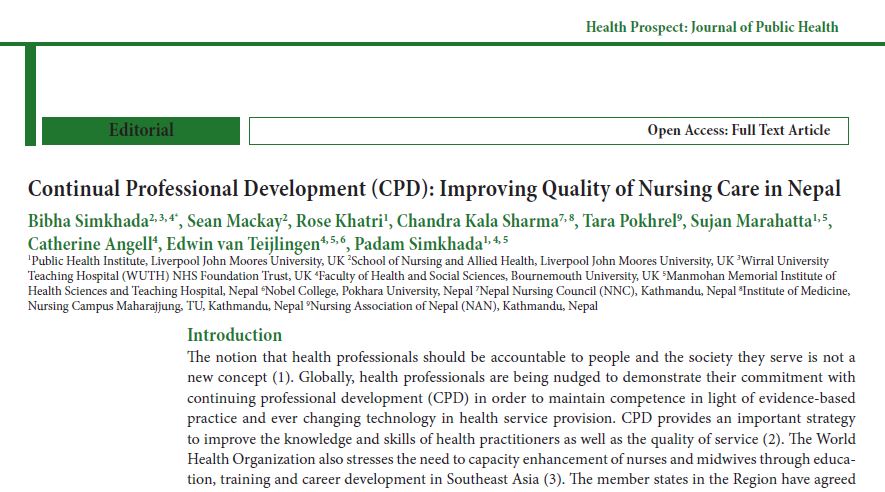 In the final week of 2016 the journal Health Prospect published our editorial on the importance of introducing nursing CPD in Nepal [1]. This editorial is based on a collaborative study between BU, Liverpool John Moores University (LJUM), Manmohan Memorial Institute of Health Sciences (MMIHS) in Nepal, Nepal Nursing Council (NNC), and the Nursing Association of Nepal (NAN). The BU part of the study is led by Dr. Catherine Angell based in the Centre for Midwifery, Maternal & Perinatal Health (CMMPH) and funded by a small grant from BU’s Centre for the Excellence in Learning. Two of our co-authors from LJMU Dr. Bibha Simkhada and Prof. Padam Simkhada are also Visiting Faculty at BU. The project is a true FUSION project as the Research, will inform Education (in the form of CPD) which will in turn improve Practice (of the many thousands of nurses in Nepal).
In the final week of 2016 the journal Health Prospect published our editorial on the importance of introducing nursing CPD in Nepal [1]. This editorial is based on a collaborative study between BU, Liverpool John Moores University (LJUM), Manmohan Memorial Institute of Health Sciences (MMIHS) in Nepal, Nepal Nursing Council (NNC), and the Nursing Association of Nepal (NAN). The BU part of the study is led by Dr. Catherine Angell based in the Centre for Midwifery, Maternal & Perinatal Health (CMMPH) and funded by a small grant from BU’s Centre for the Excellence in Learning. Two of our co-authors from LJMU Dr. Bibha Simkhada and Prof. Padam Simkhada are also Visiting Faculty at BU. The project is a true FUSION project as the Research, will inform Education (in the form of CPD) which will in turn improve Practice (of the many thousands of nurses in Nepal).
 Health Prospect is an Open Access journal and therefore freely available for any one to read online.
Health Prospect is an Open Access journal and therefore freely available for any one to read online.
Prof. Edwin van Teijlingen
CMMPH
Reference:
- Simkhada, B., Mackay, S., Khatri, R., Sharma, C.K., Pokhrel, T., Marahatta, S., Angell, C., van Teijlingen, E., Simkhada, P. (2016) Continual Professional Development (CPD): Improving Quality of Nursing Care in Nepal, Health Prospect 15 (3):1-3 http://www.nepjol.info/index.php/HPROSPECT/article/view/16326/13255
SKIMA 2016
The 10th International Conference on Software, Knowledge, Information Management and Application (SKIMA 2016) was held from 15 to 17 December 2016 in Chengdu, China. The Conference was organised by the EU Erasmus Mundus FUSION project consortium and was hosted by Chengdu University of Informatics Technology, supported by Chengdu University, Zhongyuan University of Technology and Bourmouth University. The SKIMA organisation committee members, Prof Hongnian Yu (General Chair), Prof Jiliu Zhou (General Co-chair, President of Chengdu University of Informatics Technology), Prof Dongyun Wang (General Co-chair, Vice President of Huanghuai University), Dr Shuang Cang (Programme Chair), Prof Keshav Dahal (UK), Prof Alamgir Hossain (UK), Prof Yun Li (UK), Prof Yacine Ouzrout (France), Prof Rameshwar Rijal (Nepal), Prof Yuson Ou (China), Prof He Jia (China), Prof Luigi Vladareanu (Romania), Dr Shengjun Wen (China), Prof John Mo (Australia), Dr Zoltán Szabó (Hungary), Dr Aihui Wang (China), Dr. Ingrid Rügge (Germany), Dr Leo Chen (China), Prof Teresa Goncalves (Portugal), and about 200 scholars from 14 countries participated the conference.
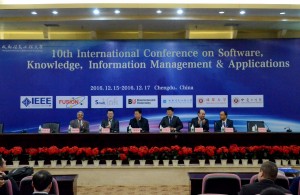
The conference general chair, Prof Hongnian Yu thanked the local team from Chengdu University of Informatics Technology for their great efforts and supports in making this conference successful. He expressed his sincere appreciate for the support from the EU Erasmus Mundus Programme, IEEE Chengdu Section, Chengdu University, Zhongyuan University of Technology, and Bournemouth University. Prof Yu also introduced the SKIMA 10 years history and wished the SKIMA enhancing the collaboration and exchange between EU and Asia.
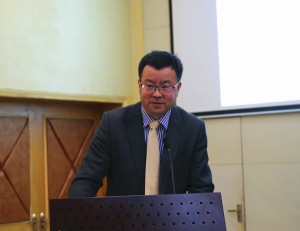
The SKIMA 2016 General Co-chair, President of Chengdu University of Informatics Technology, Prof Jiliu Zhou made the welcome speech. Prof Zhou welcomed all the participants to Chengdu, introduced the audiences the developing history of Chengdu University of Informatics Technology, and congratulated the conference achievements.
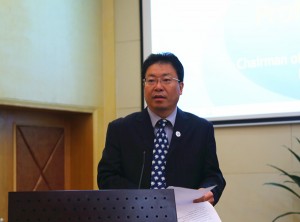
The SKIMA series was started in an international collaboration context between research professionals in Western and Asian countries in Chiang Mai, Thailand 2006. Subsequently, the next SKIMA conferences were organized in Kathmandu, Nepal in 2008; Fez, Morocco in 2009; Paro, Bhutan in 2010; Benevento, Italy in 2011, Chengdu, China in 2012, Chiang Mai, Thailand in 2013, Dhaka, Bangladesh in 2014, Kathmandu, Nepal 2015. With the technical co-sponsorship of IEEE Chengdu Section, all the accepted conference papers will be submitted for acceptance into IEEE Xplore so EI indexed.














 Expand Your Impact: Collaboration and Networking Workshops for Researchers
Expand Your Impact: Collaboration and Networking Workshops for Researchers Visiting Prof. Sujan Marahatta presenting at BU
Visiting Prof. Sujan Marahatta presenting at BU 3C Event: Research Culture, Community & Can you Guess Who? Thursday 26 March 1-2pm
3C Event: Research Culture, Community & Can you Guess Who? Thursday 26 March 1-2pm UKCGE Recognised Research Supervision Programme: Deadline Approaching
UKCGE Recognised Research Supervision Programme: Deadline Approaching ECR Funding Open Call: Research Culture & Community Grant – Apply now
ECR Funding Open Call: Research Culture & Community Grant – Apply now ECR Funding Open Call: Research Culture & Community Grant – Application Deadline Friday 12 December
ECR Funding Open Call: Research Culture & Community Grant – Application Deadline Friday 12 December MSCA Postdoctoral Fellowships 2025 Call
MSCA Postdoctoral Fellowships 2025 Call ERC Advanced Grant 2025 Webinar
ERC Advanced Grant 2025 Webinar Update on UKRO services
Update on UKRO services European research project exploring use of ‘virtual twins’ to better manage metabolic associated fatty liver disease
European research project exploring use of ‘virtual twins’ to better manage metabolic associated fatty liver disease